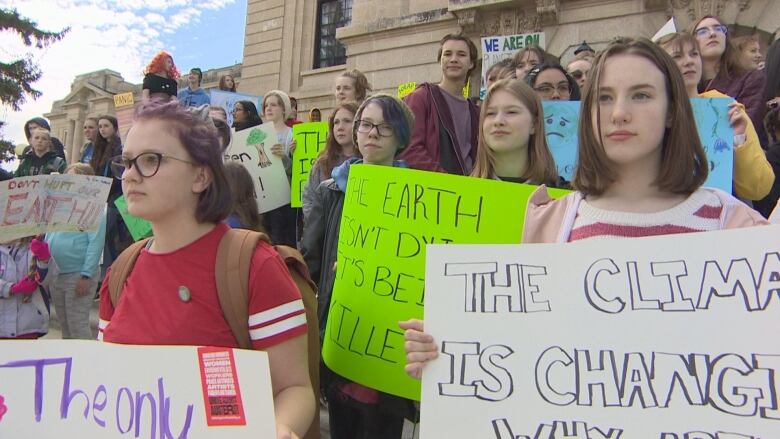Court's carbon tax decision shows division, was a narrow win for federal government: constitutional lawyers
Supreme Court of Canada likely to hear case, says Sask. lawyer Khurram Awan

One Saskatchewan constitutional lawyer says the province's Court of Appeal's decision on the federally imposed carbon tax was a win for Justin Trudeau's government but perhaps not the win it was looking for.
And another says he expects it will be months before the case winds its way to Canada's highest court.
On Friday, the Saskatchewan Court of Appeal ruled in a split 3-2 decision that the federal government'scarbon tax, imposed on provinces deemed not to have sufficient plans of their own, isconstitutional.
Khurram Awan, a constitutional lawyer based in Regina, analyzed the decision andsaid all five judges agreed on one point: climate change is a problem. But that was about as far asagreement between the majority judges and the dissenting judges went.
Awan said the three judges who ruled in favour found a co-ordinated national response, like a carbon tax, is necessary to deal with climate change.
"[The minority] believe that the solution to the problem has to account for regional diversity and broad provincial autonomy to tailor solutions to deal with climate change."

Awan said those who ruled against the carbon tax saw it as federal legislation intruding on provincial jurisdiction, which they found could have a "tremendous" impact on industry and daily activity in the province.
That, the dissenting judges said, is"not reconcilable with the distribution powers under the Constitution," Awan said.
"When you take these two approaches, and you look forward, you really see thatthis decision encapsulates the tension between the majority and the minority about the extent to which the legislation intrudes on provincial jurisdiction, and the way that we have to deal with climate change within the Canadian constitutional framework."
Supreme Court likely to hear case
Under the Supreme Court Act, provinces have an automatic right of appeal for provincial reference opinions. Therefore the Supreme Court cannot refuse to hear an appeal if the province submits one.
Awan said the fact that other provincial courts of appeal are set to hear, or have already heard, legal challenges also illustrates the fact that the carbon tax is of national importance.
Ontario's Appeal Court recently heard arguments in that province's legal challenge against the tax. Manitoba's premier said that province will go ahead with its legal challenge. Newly elected Alberta Premier Jason Kenneyhas said he'll scrap that province's existing carbon tax, which may set up a legal challenge from that province too.
Premier Scott Moe told reporters on Friday that incremental costs of the appeal to the Supreme Court of Canada will be "zero" to taxpayers.
"Any time you're going to court on a matter of importance, there is some cost associated with it," Awan said.
"With respect to costs at the Supreme Court of Canada, it would be fair to say that there will be no additional cost to the government of Saskatchewan, because the Crown lawyers employed by the government are salaried employees."
He noted there will be incremental costs incurred by groups looking to intervene in the case.
Awan expects to see many interveners, from all walks of life, come forward should the case appear before the Supreme Court of Canada, simply based on the broad interest that the legislation has for different groups it impacts.
Awan speculated the Supreme Court of Canada could wait until after the next federal election to release its decision on the matter.
A 'specialized' decision
Dwight Newman, a law professor at the University of Saskatchewan, said Friday's decision was specialized to the question of a carbon tax and may not have broader constitutional implications.
"The federal government won on the result, but the federal argument as to the reason for that result was actually specifically rejected," he told CBC Radio's Afternoon Edition.
The federal government argued it has the right to regulate greenhouse gas emissions because theirimpact is felt nationally giving them the right to implement the carbon tax under the Constitution, which states the federal government can pass laws for the"peace, order and good government of Canada."
Newman said that while the ruling came out in favour of the federal government, the court actually rejected their argument, ruling in favour of the narrower issue of a carbon tax.
"They basically end up saying if you carve out the specific idea of setting a particular level on the price of carbon, that that's something that could be within the federal government's peace, order and good governance power," he said.
"It's actually a very narrow decision, much more so than the federal government had argued for.It's almost a specialized decision just about this type of a carbon tax, and the court said it was permissible, but its decisions wouldn't really extend federal environmental jurisdiction any farther than before."
Corrections
- A previous version of this story stated the Supreme Court of Canada is likely to hear an appeal. In fact, under the Supreme Court Act, provinces have an automatic right of appeal for provincial reference opinion. Therefore the Supreme Court of Canada cannot refuse to hear an appeal if the province submits one.May 08, 2019 12:17 PM CT
With files from CBC Radio's Afternoon Edition













_(720p).jpg)


 OFFICIAL HD MUSIC VIDEO.jpg)
.jpg)



























































































